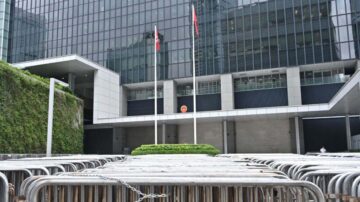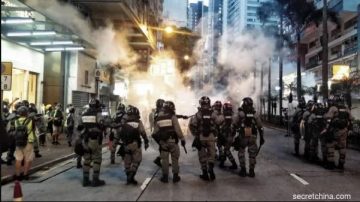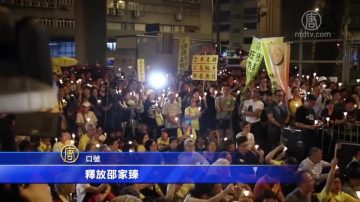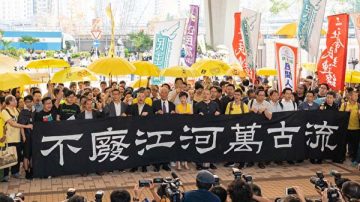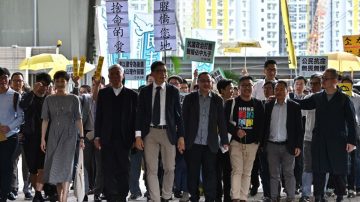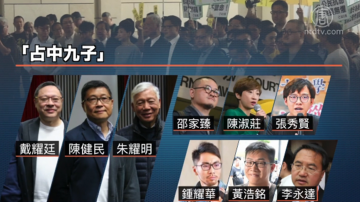【新唐人2014年09月01日訊】近來,香港民眾要求實現特首真普選的呼聲越發強烈。但同時,北京當局在拋出「一國兩制」白皮書後,不斷造勢,打壓香港的真普選運動。31號,中共全國人大常委會更通過決議說,要成為特首候選人,必須得到中共控制的提名委員會半數以上的委員支持。這意味著,「公民提名」真普選方案被中共徹底封殺,香港局勢可能將掀起更大波瀾。
31號下午4點多,大陸官媒刊發了中共《全國人民代表大會常務委員會關於香港特別行政區行政長官普選問題和2016年立法會產生辦法的決定》。
一如外界所預測的,中共全國人大的決定宣稱,特首候選人只能由「提名委員會」提名,候選人必須要得到半數以上委員支持,候選人數限制為2到3人。「提名委員會」的人員構成及委員產生辦法,都參照第四屆「選舉委員會」。
對此,香港「和平佔中」運動發起人之一,香港中文大學公民社會研究中心主任陳健民表示,如果北京當局全面封殺真普選方案,港人將別無選擇,只能「佔領中環」。
「和平佔中」運動發起人陳健民:「因為我們已經講過了,當已經沒有對話的空間、真普選已經沒有希望的時候,就是『佔領中環』出現的時候。所以為了維護我們的尊嚴,就會採取『佔領中環』。『佔領中環』的時候一定是和平的、非暴力的。」
陳健民談到,中共的這個決定出臺之後,港人將徹底打消對政改的期待,也看清了所謂「民主回歸」的騙局。市民將不會再通過港府或議會去解決問題,而是會走向街頭表達訴求。陳健民強調,未來香港的社會矛盾會更激烈,中共在香港的管制會更困難。
陳健民:「為甚麼我們要通過『和平佔中』這個運動?其實我們希望能夠發出一個警告給社會也給北京,希望他們理解到我們已經是面臨一個非常危險的管制危機。非常可惜啊北京還是聽不到這個信息。」
北京對港人的「佔中運動」非常恐慌,一再聲稱將嚴厲打壓。前國務院港澳辦副主任、中國全國港澳研究會會長陳佐洱就曾威脅,「佔中」是港版的街頭政治、顏色革命,企圖推翻現政權,下場只會是頭破血流。
中共黨媒《人民日報》也發表文章稱,特首必須「愛國愛港」,也就是不可以對抗中共政權。
按照香港《基本法》,香港特首最終要由普選產生,在經過多次推遲之後,北京無奈答應,從2017年開始實行特首普選。但在具體的普選框架上,中共慾通過操控提名委員會來指定特首候選人,而港人、尤其是泛民主黨人士則強烈要求實現真普選,也就是特首候選人可以由普通公民或團體提名。
為防止中共封殺真普選,去年,戴耀廷、陳健民及朱耀明等人發起了「讓愛與和平佔領中環」運動,呼籲港人在必要的時候佔領中環,對當局進行和平抗命。
在「622佔中公投」中,近80萬港人表態支持真普選,凸顯強大民意。
「真普選聯盟」召集人、香港城市大學政治學教授鄭宇碩:「事實上我們面對的危險不單是有沒有一個民主選舉的問題,這是我們整個的核心價值、我們的生活方式、我們香港人的精神要受到威脅。」
31號下午,「佔中三子」、「真普選聯盟」、「民主黨」、「民陣」、「學聯」和「學民思潮」等人士和團體,都聚集在香港立法會大樓舉行會議。晚上,佔中發起人在港府總部旁的添馬公園組織大型集會,並宣佈後續行動。
雖然「佔中三子」已經表明週日不會佔中,但警方仍如臨大敵,調動約5000警力,並在中環多處擺放大量鐵馬。週四,中共軍隊的裝甲車更曾在香港鬧市駛過,被外界批評:當局在「佔中」前夕刻意製造緊張氣氛。
採訪/易如編輯/李謙後製/李智遠
Countdown of Occupy Central Begins As the CCP Denies Real Suffrage
Recently, Hong Kong people’s voices are growing stronger
in demanding real suffrage.
However, the Chinese Communist Party (CCP) has attempted
to repeatedly suppress them following its White Paper
on Hong Kong.
On Aug. 31, the CCP’s National People’s Congress (NPC)
Standing Committee passed a resolution
requiring any chief executive candidates
to be approved by over half of its nominating committee.
This completely denies the plan of direct nomination
by Hong Kong people, and will probably trigger more
resistance in the region.
After 4pm on Aug. 31, the CCP’s mouthpieces announced
“A Decision by the NPC Standing Committee on Suffrage
of Chief Executive and 2016 Legislative Council
in Hong Kong.”
As expected, the decision said chief executive candidates
can only be nominated by a special nominating committee
and have to be approved by half of its members,
who will select two or three candidates.
The selection of committee members will follow rules
for the fourth Sector of Election Committee.
Chan Kin-man, a founder of the Occupy Central movement
and director of Center for CUHK’s Civil Society Studies,
said Hong Kong people would have no choice but to
Occupy Central if the CCP denies any plan for real suffrage.
Chan Kin-man, founder of Occupy Central: ”We have
already said that when there is no space for conversation
and we are hopeless in having a real suffrage,
the Occupy Central movement will start.
To protect our dignity, we will occupy Central.
Of course the movement must be carried out
in a peaceful and non-violent manner.”
Chan also said the CCP’s decision will wipe out
any expectations of a political reform.
Hong Kong people will realize that “the recurrence
of democracy” is a fraud.
They will no longer try to solve the problem through
Hong Kong’s government or council.
Instead, they will voice their demands through
street protests.
Chan believes that Hong Kong will see more social conflicts
and the CCP will face more difficulties in
governing Hong Kong.
Chan Kin-man: ”Why did we start Occupy Central
movement?
We hope to deliver a warning message
to the whole society and Beijing.
We hope the CCP can understand that a very dangerous
crisis is coming.
It is a pity that they fail to receive the message.”
The CCP has been in a panic over Occupy Central, repeatedly
claiming it will harshly crackdown on the movement.
Chen Zuo’er, former deputy director of Hong Kong and
Macau Affairs Office, made threatening comments,
saying that Occupy Central is Hong Kong’s street politics
and the Color Revolution in overturning the CCP authority,
and will only result in bloodshed.
The CCP mouthpiece, People’s Daily, also said the chief
executive of Hong Kong must “love the country and
the city,” and equivalently should never resist
any order from the party.
According to basic Hong Kong Law, the chief executive
has to be elected in a suffrage.
After deferring the plan several times, Beijing was
finally forced to promise a suffrage plan beginning 2017.
However, the CCP attempts to name all candidates
by itself through controlling the nominating committee.
On the other hand, Hong Kong people, especially pro-
democracy groups, strongly demand a real suffrage
that accepts all candidates nominated by any citizens
or groups.
To resist the CCP’s suppression of a real suffrage,
Tai Yiu Ting, Chan Kin-man, Chu Yiu-ming and several others
initiated the “Let Love and Peace Occupy Central”
movement.
They called on all Hong Kong residents to stand out
and occupy Central if necessary,
as a peaceful civil disobedience against the CCP.
In the June 22 referendum, nearly 800,000 Hong Kong
people voted for a real suffrage, showing strong public
opinion to support the movement.
Joseph Cheng, City University of Hong Kong, political science
professor: ”In fact, we are facing a crisis of not only
whether we will have a democratic election.
We are facing a threat to our core values, our life style
and our spirit.”
On the afternoon of Aug. 31, founders of Occupy Central,
Alliance for True Democracy, Democratic Party, Civil Human
Rights Front, Federations of Students, Scholarism
and other activist groups assembled at the Legislative
Building for discussion.
In the evening, Occupy Central promoters gathered
at Tamar Park near the Central Government to announce
plans for the next step.
Founders of Occupy Central group said they would not start
the movement on Sunday.
However, Hong Kong police still sent 5,000 people to Central
and prepared a large number of barriers around the area.
On Thursday, the CCP’s armored vehicles traveled across
Hong Kong’s busy regions.
This was criticized as creating tensions right before
the Occupy Central movement starts.
Interview/YiRu Edit/LiQian Post-Production/Li Zhiyuan
31號下午4點多,大陸官媒刊發了中共《全國人民代表大會常務委員會關於香港特別行政區行政長官普選問題和2016年立法會產生辦法的決定》。
一如外界所預測的,中共全國人大的決定宣稱,特首候選人只能由「提名委員會」提名,候選人必須要得到半數以上委員支持,候選人數限制為2到3人。「提名委員會」的人員構成及委員產生辦法,都參照第四屆「選舉委員會」。
對此,香港「和平佔中」運動發起人之一,香港中文大學公民社會研究中心主任陳健民表示,如果北京當局全面封殺真普選方案,港人將別無選擇,只能「佔領中環」。
「和平佔中」運動發起人陳健民:「因為我們已經講過了,當已經沒有對話的空間、真普選已經沒有希望的時候,就是『佔領中環』出現的時候。所以為了維護我們的尊嚴,就會採取『佔領中環』。『佔領中環』的時候一定是和平的、非暴力的。」
陳健民談到,中共的這個決定出臺之後,港人將徹底打消對政改的期待,也看清了所謂「民主回歸」的騙局。市民將不會再通過港府或議會去解決問題,而是會走向街頭表達訴求。陳健民強調,未來香港的社會矛盾會更激烈,中共在香港的管制會更困難。
陳健民:「為甚麼我們要通過『和平佔中』這個運動?其實我們希望能夠發出一個警告給社會也給北京,希望他們理解到我們已經是面臨一個非常危險的管制危機。非常可惜啊北京還是聽不到這個信息。」
北京對港人的「佔中運動」非常恐慌,一再聲稱將嚴厲打壓。前國務院港澳辦副主任、中國全國港澳研究會會長陳佐洱就曾威脅,「佔中」是港版的街頭政治、顏色革命,企圖推翻現政權,下場只會是頭破血流。
中共黨媒《人民日報》也發表文章稱,特首必須「愛國愛港」,也就是不可以對抗中共政權。
按照香港《基本法》,香港特首最終要由普選產生,在經過多次推遲之後,北京無奈答應,從2017年開始實行特首普選。但在具體的普選框架上,中共慾通過操控提名委員會來指定特首候選人,而港人、尤其是泛民主黨人士則強烈要求實現真普選,也就是特首候選人可以由普通公民或團體提名。
為防止中共封殺真普選,去年,戴耀廷、陳健民及朱耀明等人發起了「讓愛與和平佔領中環」運動,呼籲港人在必要的時候佔領中環,對當局進行和平抗命。
在「622佔中公投」中,近80萬港人表態支持真普選,凸顯強大民意。
「真普選聯盟」召集人、香港城市大學政治學教授鄭宇碩:「事實上我們面對的危險不單是有沒有一個民主選舉的問題,這是我們整個的核心價值、我們的生活方式、我們香港人的精神要受到威脅。」
31號下午,「佔中三子」、「真普選聯盟」、「民主黨」、「民陣」、「學聯」和「學民思潮」等人士和團體,都聚集在香港立法會大樓舉行會議。晚上,佔中發起人在港府總部旁的添馬公園組織大型集會,並宣佈後續行動。
雖然「佔中三子」已經表明週日不會佔中,但警方仍如臨大敵,調動約5000警力,並在中環多處擺放大量鐵馬。週四,中共軍隊的裝甲車更曾在香港鬧市駛過,被外界批評:當局在「佔中」前夕刻意製造緊張氣氛。
採訪/易如編輯/李謙後製/李智遠
Countdown of Occupy Central Begins As the CCP Denies Real Suffrage
Recently, Hong Kong people’s voices are growing stronger
in demanding real suffrage.
However, the Chinese Communist Party (CCP) has attempted
to repeatedly suppress them following its White Paper
on Hong Kong.
On Aug. 31, the CCP’s National People’s Congress (NPC)
Standing Committee passed a resolution
requiring any chief executive candidates
to be approved by over half of its nominating committee.
This completely denies the plan of direct nomination
by Hong Kong people, and will probably trigger more
resistance in the region.
After 4pm on Aug. 31, the CCP’s mouthpieces announced
“A Decision by the NPC Standing Committee on Suffrage
of Chief Executive and 2016 Legislative Council
in Hong Kong.”
As expected, the decision said chief executive candidates
can only be nominated by a special nominating committee
and have to be approved by half of its members,
who will select two or three candidates.
The selection of committee members will follow rules
for the fourth Sector of Election Committee.
Chan Kin-man, a founder of the Occupy Central movement
and director of Center for CUHK’s Civil Society Studies,
said Hong Kong people would have no choice but to
Occupy Central if the CCP denies any plan for real suffrage.
Chan Kin-man, founder of Occupy Central: ”We have
already said that when there is no space for conversation
and we are hopeless in having a real suffrage,
the Occupy Central movement will start.
To protect our dignity, we will occupy Central.
Of course the movement must be carried out
in a peaceful and non-violent manner.”
Chan also said the CCP’s decision will wipe out
any expectations of a political reform.
Hong Kong people will realize that “the recurrence
of democracy” is a fraud.
They will no longer try to solve the problem through
Hong Kong’s government or council.
Instead, they will voice their demands through
street protests.
Chan believes that Hong Kong will see more social conflicts
and the CCP will face more difficulties in
governing Hong Kong.
Chan Kin-man: ”Why did we start Occupy Central
movement?
We hope to deliver a warning message
to the whole society and Beijing.
We hope the CCP can understand that a very dangerous
crisis is coming.
It is a pity that they fail to receive the message.”
The CCP has been in a panic over Occupy Central, repeatedly
claiming it will harshly crackdown on the movement.
Chen Zuo’er, former deputy director of Hong Kong and
Macau Affairs Office, made threatening comments,
saying that Occupy Central is Hong Kong’s street politics
and the Color Revolution in overturning the CCP authority,
and will only result in bloodshed.
The CCP mouthpiece, People’s Daily, also said the chief
executive of Hong Kong must “love the country and
the city,” and equivalently should never resist
any order from the party.
According to basic Hong Kong Law, the chief executive
has to be elected in a suffrage.
After deferring the plan several times, Beijing was
finally forced to promise a suffrage plan beginning 2017.
However, the CCP attempts to name all candidates
by itself through controlling the nominating committee.
On the other hand, Hong Kong people, especially pro-
democracy groups, strongly demand a real suffrage
that accepts all candidates nominated by any citizens
or groups.
To resist the CCP’s suppression of a real suffrage,
Tai Yiu Ting, Chan Kin-man, Chu Yiu-ming and several others
initiated the “Let Love and Peace Occupy Central”
movement.
They called on all Hong Kong residents to stand out
and occupy Central if necessary,
as a peaceful civil disobedience against the CCP.
In the June 22 referendum, nearly 800,000 Hong Kong
people voted for a real suffrage, showing strong public
opinion to support the movement.
Joseph Cheng, City University of Hong Kong, political science
professor: ”In fact, we are facing a crisis of not only
whether we will have a democratic election.
We are facing a threat to our core values, our life style
and our spirit.”
On the afternoon of Aug. 31, founders of Occupy Central,
Alliance for True Democracy, Democratic Party, Civil Human
Rights Front, Federations of Students, Scholarism
and other activist groups assembled at the Legislative
Building for discussion.
In the evening, Occupy Central promoters gathered
at Tamar Park near the Central Government to announce
plans for the next step.
Founders of Occupy Central group said they would not start
the movement on Sunday.
However, Hong Kong police still sent 5,000 people to Central
and prepared a large number of barriers around the area.
On Thursday, the CCP’s armored vehicles traveled across
Hong Kong’s busy regions.
This was criticized as creating tensions right before
the Occupy Central movement starts.
Interview/YiRu Edit/LiQian Post-Production/Li Zhiyuan

